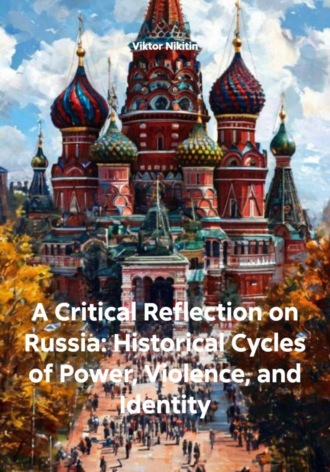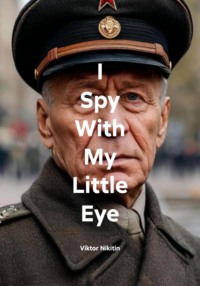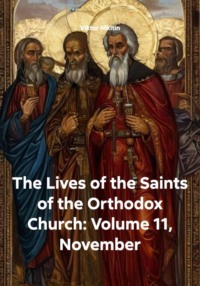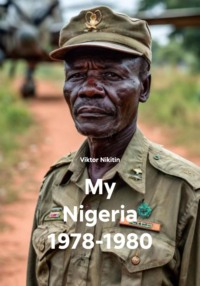
Полная версия
A Critical Reflection on Russia: Historical Cycles of Power, Violence, and Identity

Viktor Nikitin
A Critical Reflection on Russia: Historical Cycles of Power, Violence, and Identity
There are nations whose histories unfold through cycles of flourishing and collapse, through alternating periods of political vitality and decay. And then there are nations whose histories seem almost gravitationally bound to a single trajectory, as though trapped within an orbit formed centuries earlier. Russia belongs unmistakably to this second category. It is not simply that the country has endured tragedy; countless nations have done so. What sets Russia apart is the remarkable consistency with which its political institutions have reproduced the forms of suffering they inherited, preserving patterns of brutality, suspicion, and authoritarian reflex long after other societies abandoned such habits. There is a peculiar continuity, a strange inertia, that makes the past in Russia feel not distant or instructive but present, tangible, and unresolved.
The beginning of this historical pattern is most clearly visible in the reign of Ivan IV, whose moniker “the Terrible” fails to capture the systemic quality of his cruelty. The oprichnina he created was not merely a corps of enforcers but an early experiment in the psychological engineering of society. It established terror not as an occasional tool but as a foundational principle of governance. The policies he enacted were intended not only to punish enemies but to annihilate the very possibility of independent thought among the nobility, to dismantle the social structures that might restrain autocracy. His paranoia became the architecture of the Russian state. The symbolism—black horses, black clothing, the chilling ritualism of executions—was not incidental but central. It inaugurated a political aesthetics in which the ruler derived legitimacy from fear, not trust.
The significance of this legacy becomes clearer when contrasted with developments elsewhere in Europe. While early modern states certainly employed violence, most gradually evolved toward greater legal constraints upon sovereign authority. Russia did not. Instead, it reinforced the idea that authority flowed from the will of a solitary ruler whose legitimacy required neither constitutional justification nor moral accountability. Later tsars would occasionally borrow the vocabulary of reform, but the underlying structure remained anchored in the absolutist model established during Ivan’s time. This is not to suggest that Ivan alone “determined” the course of Russian history, but rather to highlight how political cultures solidify around foundational moments. Russia’s foundational moment was not one of negotiation or compromise but one of spectacle, terror, and centralized domination.
This helps explain why, even as Western Europe moved toward Enlightenment-era transformations in the eighteenth century, Russia remained notably resistant. Its governing elite, insulated from the political and intellectual currents of the time, managed to preserve a remarkably static social order. Philosophical debates that captivated the salons of Paris, the universities of Scotland, and the courts of Vienna found only partial and often superficial expression in St. Petersburg. Catherine the Great corresponded with Voltaire and Diderot, but her reign nonetheless perpetuated serfdom and intensified autocratic centralization. Russian intellectual life existed, of course, and at times produced extraordinary insights, but it operated within constraints that made genuine reform difficult.
The story of Russia in the nineteenth century is often told as one of delayed modernization, but the phrase “delayed” implies a natural progression interrupted or slowed. What happened in Russia was more complicated: modernization efforts repeatedly collided with a deeply entrenched political mentality. The structures of serfdom—more than a labor system, it was a worldview—ensured that millions lived under conditions resembling medieval dependency at a time when much of Europe had moved toward industrial transformation. The tragic ironies intensify when considering that Russia possessed immense cultural vitality. Its literature, music, and art blossomed during this period, yet the society that produced such brilliance was simultaneously immobilized by its political apparatus.
The biography of Taras Shevchenko encapsulates this contradiction. A serf who became a painter and poet of extraordinary sensitivity, Shevchenko might in another context have been allowed to flourish as a cultural figure. But in Russia, his creative gifts were seen as subversive. His works, which articulated a vision of identity and dignity at odds with imperial ideology, were interpreted not as cultural contributions but as threats. His arrest and forced conscription into a punitive military service were characteristic of an empire that saw imagination as dangerous. The tragedy lies not only in Shevchenko’s suffering but in the fact that the state could not fathom that his creativity might enrich society. Instead, it viewed him through the narrow lens of political anxiety, demonstrating once more the fragility of Russian autocracy in the face of individual expression.
The Emancipation of 1861, praised by some as a step toward modernization, was in truth an exercise in rhetorical reform—a gesture that preserved the foundations of inequality under the guise of liberation. The serfs were freed, but their freedom came tethered to redemption payments, inequitable land allocations, and a state apparatus that ensured dependence persisted. In many cases, the reforms deepened rural poverty. What should have been a moment of transformation became, instead, an elaborate bureaucratic performance. The state sought to modernize without relinquishing its control, revealing a pattern that would reappear in nearly every subsequent attempt at reform.
From within this chronically frustrated society emerged Lenin, whose ideology promised rupture with the past but whose practices often reproduced its essential features. His revolution was born of legitimate grievances—inequality, political repression, economic stagnation—but the state it created quickly mirrored the same suspicion of autonomy that had characterized tsarist governance. Churches were not only closed but desecrated; priests were not only removed but executed; villages resisting requisitioning were not only punished but starved. The terror of the early Bolshevik years did not come from nowhere. It emerged from an inherited political imagination that believed authority must be total and dissent must be eradicated. Lenin’s consolidation of power was not an aberration but the continuation of a tradition in new ideological clothing.
The Soviet war against the newly formed Polish state in 1919 illustrates how quickly revolutionary rhetoric could mask imperial ambition. The Bolsheviks claimed they were spreading liberation, yet they marched with the logic of conquest. The war revealed an uncomfortable truth: that the ideological vocabulary of internationalism did not eliminate the imperial reflex. Indeed, it often sharpened it, recasting domination as moral duty.
When the Soviet Union was founded in 1922, it became the vessel through which these contradictions intensified. It is tempting to view the USSR as a rupture, a departure from Russia’s past, yet in many respects it was a continuation—a more systematic, ideological, and technologically empowered version of the autocratic logic that long preceded it. The Soviet state did not simply rule through violence; it attempted to reshape human consciousness, constructing new myths, new rituals, new forms of loyalty. It sought to legislate reality.
Конец ознакомительного фрагмента.
Текст предоставлен ООО «Литрес».
Прочитайте эту книгу целиком, купив полную легальную версию на Литрес.
Безопасно оплатить книгу можно банковской картой Visa, MasterCard, Maestro, со счета мобильного телефона, с платежного терминала, в салоне МТС или Связной, через PayPal, WebMoney, Яндекс.Деньги, QIWI Кошелек, бонусными картами или другим удобным Вам способом.









